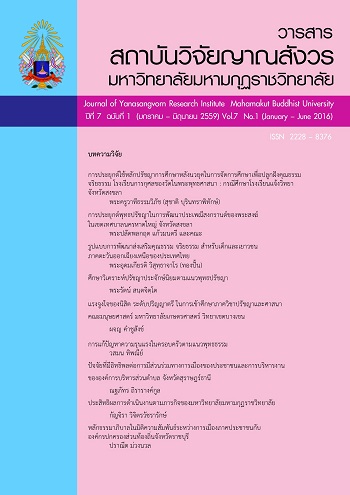The Buddhist Philosophy Applied to Develop the Songkran Festival of Buddhist Monks in the Municipalisty of Hat Yai, Songkhla Province
Main Article Content
Abstract
The objectives of this dissertation are as follows : 1) to study the songkran festival of buddhist monks in the municipalisty of Hat Yai, Songkhla province. 2) To study the Buddhist Philosophy as a tool for problem solve to develop songkran festival of buddhist monks in the municipalisty of Hat Yai, Songkhla province. 3) To apply Buddhist philosophy solutions developed songkran festival of buddhist monks in the municipalisty of Hat Yai, Songkhla province. And 4) to create new knowledge and develop the songkran festival of buddhist monks in the municipalisty of Hat Yai, Songkhla province in very models. This qualitative research is the qualitative research by discursive methods and the discursive method, Under an analytical study of Appreciation and taxonomy to contribute a new philosophical knowledge. The results show that : The history of the Songkran Festival in the Municipality of Hat Yai was classified into three stages the past stage when the traditional custom was practiced, the second stage when the Municipality of Hat Yai continuously organized this amual festival, and the third stage when the Tourism Organization of Thailand organized the festival in order to boost cultural tourism. The processes and activities of the Songkran Festival in the Municipality of the Hat Yai could be classified in to two parts: 1) The processes and activities perfomed by the Municipality. These were the preparations before the songkan Day which consisted ofmaking guidelines of what to do during the festival, making a job description for each duty, allocating each duty with personnel, publicizing by the Municipality itselfand with the cooperation ofother organizations, and decorating the city. Activities performed on the Songkran Day were those conceming the traditional custom such as giving offerings to Brahma (a Hindu God), celebrating Goddess Kuanim image, giving offerings and bathing to Phra Buddhasihing image. For sports activities, there were tennis competitions and aerobic dance competitions. There was a Miss Songkran beauty competition. For enteminment, there were perfomances on stage and mid-night Songkran festivities. 2) processes and activities performed by people consisted of the preparation before the Songkran Day such as house cleaning, preparation of clothing and oraments' preparation of offerings for gods and goddess and food for monks. Activities performed on the Songkran Day were giving food to monks,bathing Buddha images with fragrant water, bathing elderly and water playing . Values arising from the Songkran Festival in the Municipality of Hat Yai could be classified into two aspects: socio-cultural and tourism. On socio-cultural aspects, the festival strengthened the relationship among family members, promoted, preserveed and sustained the traditionnal customs as well as maintained faith in Buddhism. On tourism aspect, the festival attracted both foreign and Thai tourists creating the circulation of money in the area. Now the famous activity songkran festival of buddhist monks in the municipalisty of Hat Yai, Songkhla province was Boondaun 5 Homphar pranon. It organized at Mahattamongklaram Templ on 14-15 April every year. The famous activities were 1) Covers the largest reclining Buddha in the third world, 2) Build Sand pagodas, 3) Bathing the Buddha millennium, 4) Pour water on the hands of revered elders and ask for blessing, and 5) To organize Songkran period. The new knowledge from study the songkran festival found that to apply Buddhist philosophy solutions developed songkran festival of buddhist monks in the municipalisty of Hat Yai, Songkhla province were that 1) The problem of lack principles of work, 2) The problem of planning in management songkran festival, 3) The problem of role monks in management songkran festival, 4) The problem of budgets in management songkran festival, 5) The problem of times in management songkran festival, 6) The problem of community outreach, and 7) The problem of monks behavior. Buddhist philosophy which monks take to solute problems was the Sabpurisatham 7 included that to known cause, to known results, to known identity, to known tolerable, to known time, to known community, and to known personal.
Article Details
References
พระเทพเวที. (2533). พุทธธรรม ฉบับปรับปรุงและขยายความ. กรุงเทพมหานคร : โรงพิมพ์มหาจุฬาลงกรณราชวิทยาลัย


